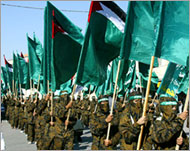Israel clears voting in East Jerusalem
Israel has given its approval for Arab residents of East Jerusalem to vote in this month’s Palestinian election but made it clear it will not tolerate campaigning by the resistance group Hamas.

The acting Israeli prime minister, Ehud Olmert, formally submitted the proposals to cabinet colleagues at a meeting on Sunday, only their second meeting since Ariel Sharon, the prime minister, suffered a massive stroke 11 days ago.
In comments carried on Israeli radio, Olmert told the meeting: “I propose to the cabinet that the election in East Jerusalem be conducted on the same basis as in 1996 and 2005.”
Palestinians living in east Jerusalem, occupied and then annexed by Israel in 1967, were able to vote in post offices during the last parliamentary elections a decade ago, and in last January’s presidential election.
Hamas disallowed
However, Olmert said Israel would not allow Hamas to campaign in East Jerusalem.
“Under no circumstances will we permit Hamas to enter Jerusalem and carry out electioneering,” he said.
Palestinian leader Mahmoud Abbas had warned that he was ready to cancel the 25 January election if Arab residents of East Jerusalem were not allowed to take part.
|
“I propose to the cabinet that the election in east Jerusalem be conducted on the same basis as in 1996 and 2005″ Ehud Olmert, |
The Palestinians want east Jerusalem as the capital of their promised state.
After meetings with Olmert and Abbas on Friday, Washington‘s Middle East envoy, David Welch, had indicated that the US wanted the election to go ahead in east Jerusalem.
But he also renewed criticism of the participation in the election of Hamas, which is fielding candidates for parliament for the first time.
“The view of the US is that there should be no place in the political process for groups and individuals who refuse to denounce terror and violence, who do not recognise Israel’s right to exist and refuse to disarm,” Welch said.
But the uneven playing field created by the Israeli ban on campaiging by Hamas in East Jerusalem has been an embarrassment for Abbas’s ruling Fatah which is facing a serious challenge from the militant group in the vote.
Mockery
At the party’s campaign launch in East Jerusalem on Saturday, Fatah candidates said the ban and other restrictions on electioneering made a mockery of Israel‘s claim to be a champion of democracy, and demanded that they should be rescinded.
“We won’t accept the restrictions,” said Jihad Abu Znaid, the sole woman candidate on the Fatah slate for the city, at a meeting which was not cleared beforehead by the Israeli authorities.
Hatim Abd al-Qadir, the head of the list, said: “We’re seeking elections like those anywhere else in the world and may the best side win.”
An opinion poll by Bir Zeit University on Saturday indicated Hamas trailing Fatah by just five percentage points.
 |
|
Opinion polls hint at growing |
The survey gave Fatah 35% support against 30% for Hamas. Polls last October 2005 gave Fatah 45% against just 23% for Hamas.
In face of the concerns triggered by its rising ratings, a prominent Hamas candidate said the group would not use its newfound electoral power to block future talks with Israel.
Shaikh Muhammad Abu Tir, who is number two on the Hamas list, told Israeli daily Haaretz: “The question of negotiations will be presented to the new parliament and, as with every issue, when we reach the parliament it will be discussed and decided in a rational manner.”
“We are not saying ‘never’,” the paper quoted him as saying.
In reference to Fatah, he said: “We’ll negotiate better than the others, who negotiated for 10 years and achieved nothing.”